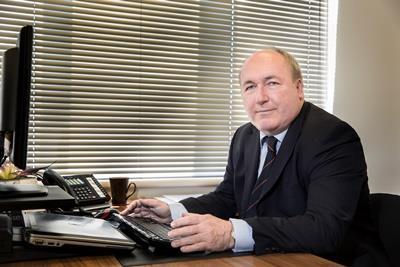
Paul Day, MD of Turners (Soham), is one of the most respected operators in the transport industry, earning plaudits for his professionalism, strategic thinking and rigorous cost control. A Cambridge maths graduate and former GB table tennis player, Day is the grandson of Turners co-founder Wallace Turner.
One supplier close to the firm says of Day: “He is good at strategy and is close to his markets. He specialises in certain niche sectors to spread his risks. He keeps excellent control of costs and has loyal staff. He is a long-term player, has a clear view of which markets to operate in and the financial strength to maintain participation. Overall, Turners is one of the best companies in the business.”
Day, the son of Wallace Turner’s daughter, joined the business in 1984 and worked alongside his grandfather and cousin Franklin Turner, the son of the other co-founder, for nearly 30 years. In 1993 the business had outgrown its Fordham depot and relocated to its current refrigerated site in Newmarket, just a mile down the road. “From there it has escalated over the past 21 years,” says Day. Today Turners employs 2,400 people and operates more than 1,100 vehicles and 1,500 trailers from 32 locations. The 13-acre Newmarket site has expanded to 47 acres, and now includes 600,000ft2 of temperature-controlled storage for 90,000 pallets.
The site is still being added to, with a new packhouse nearing completion when Motortransport.co.uk visited in January. “At the moment one-fifth of another building is used as a packhouse,” says Day. “We are converting that back to what it was originally designed for, which is a store and assembly area.”
Primary distribution
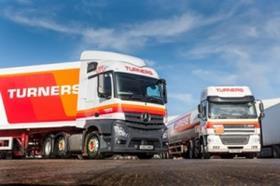
Turners’ refrigerated work is mostly for food manufacturers and importers. “The business is based on primary distribution, moving goods from suppliers to the supermarket RDCs,” says Day. “Most of the secondary distribution is done by the supermarket fleets, but we do interlink where we can with the supermarkets’ secondary fleets and we do some store deliveries. If it is imported product we collect from the ports, bring it to our site, store it, pack it, pick it – we offer all the services that a supplier will need.”
Newmarket provides a mixture of long-term storage for frozen product and transhipment for shorter shelf life chilled food.
“Generally it is supermarket chill work, and it is in and out,” says Day. “But there are products that require up to two-, three- or four-week storage and some packing to go with this, and frozen products which might be in here six to eight weeks.”
Day still has plans to continue expanding the Newmarket site as well as some other locations.
“I am hoping that we will be able to generate more business and continue the growth,” he says. “There are a few other locations I would like to grow. We have another site in Bicker, just north of Spalding, where I think there is an opportunity to expand over time. The main growing areas of the country are the East and the South East and the main points of entry for imported product are also in the East and the South East. Felixstowe, the London ports and Dover are the main routes for imports of frozen food products coming into the UK. This site is virtually the perfect location for this type of business.”
While imports of food have been growing, Turners still serves the large domestic agricultural sector in the region.
“We are concentrating on people who are producing food for the UK market,” says Day. “As long as they can grow it and get it out of the ground, we can provide all the services after that to get that product to their market.”
Day does not go along with some operators’ views that supermarket DCs are becoming unnecessarily difficult – and expensive – to deliver to.
“That is probably a sweeping statement and not necessarily showing the whole picture,” he says. “A number of supermarkets are totally realistic in my view about what can and cannot be achieved and want to work with us and their suppliers. Overall, we have got good relationships and we do not find them unreasonable to work for. There can be odd exceptions to that, but that applies in every field of work and in life.”
To improve the efficiency of the inbound supply chain, supermarkets are encouraging suppliers to work together and with their logistics contractors, something Day wholeheartedly endorses.
“We would encourage co-operation between suppliers as well as between supermarkets,” he says. “Price competitiveness has already forced people to choose the optimum least cost route to market. If there are opportunities to share transport inbound, share services on site, or to share the outbound vehicle, my experience is that the parties involved want to take them and some are already being taken.”
Turnover
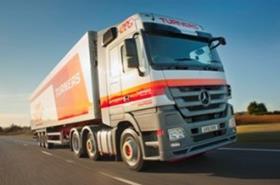
The refrigerated part of the business, including cold stores and other added-value services, accounts for around half of Turners’ turnover, while the tankers division is about 40% of the business following the loss of the Greenergy fuel contract in 2013, when Greenergy decided to take its transport in-house.
Turners still runs 160 fuel tankers for customers including BP, Tesco, Mabanaft and Phillips 66, and is also a big player in food-grade bulk transport. Containers is the smallest of Turners’ three divisions, accounting for around 10% of turnover, and while it has remained one of the most cut-throat sectors in road transport, Day says it is profitable.
“I would say it still is as competitive as it has always been,” he says, “but we have found that if you take a longer-term view the market is finding a level that allows efficient operators to make a small profit, what we class as a reasonable return on the work we do.”
Profitability
Day says there are different ways of measuring profitability. “How do you measure it?” he asks. “It depends on what you are measuring, if it is profit per employee or it is profit out of turnover. If you have a storage building and you write it off over 25 years you would have low depreciation, high capital employed and a lot of people involved, you’d have to make a higher return on turnover to be sustainable than you would on transport.
“If you are running transport you have a lot higher costs and the revenue is a lot higher so a lower profit on turnover is acceptable. People will measure profit and their return in all sorts of ways. The terminology used in some cases now is bizarre, meaningless quotes that are designed to impress. It is modern-day life.”
For the record, Turners group turnover rose to £242.1m in the year ending 28 December 2013, up from £235.8m in the previous financial year, while pre-tax profit fell slightly to £22.8m.
As a privately owned family firm, Turners does not have external shareholders to keep happy nor is it in hock to the banks. “We have used historic profits to reinvest into the business, into our fleet, into buildings and into land, and so our cost base is probably slightly lower,” says Day. “Rather than borrowing that pound and having to pay the lender before we can get any return ourselves, that element of profit comes to us.”
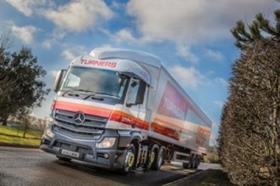
Does Day expect less efficient, more indebted operators to exit the market as the higher cost of Euro-6 trucks makes it harder to renew ageing fleets?
“Consolidation of operators is happening in transport all the time, not just in the container sector,” he says. “The cost of the trucks is escalating and if you have not recovered the full depreciation by operating the previous vehicle you then cannot afford to buy a replacement. You may still be able to afford to lease the vehicle but the cost is higher and you might then become unsustainable with that new equipment on the old transport rate. It’s a slow process though.”
Day knows the importance of utilising expensive assets like trucks and trailers as fully as possible but says there are constraints. “We would love to have all the vehicles operating 24 hours a day, seven days a week, but that is not possible,” he says. “It is possible to use the vehicle for multiple shifts, but unfortunately there are vehicles within our fleet that we cannot find a way of operating as efficiently because of different customer requirements.
“In this operation here in Newmarket we are able to use a proportion of the fleet seven days a week, 24 hours a day. The challenge here is that the actual volume of work is not flat, it is variable both by season and by day of the week. Shopping patterns dictate, for supermarkets’ work, that Thursday and Friday are much busier than the early part of the week.”
Day is always looking at new markets to move into to complement his existing business – but would a parcels carrier like the failed City Link, for example, be a step too far outside his comfort zone?
“If there was opportunity you could see, then, of course, I would look at it,” he says. “But to take on City Link when that is not our core business for a potential advantage that you might be able to use your trucks a bit more would just be foolhardy.”
Instinct
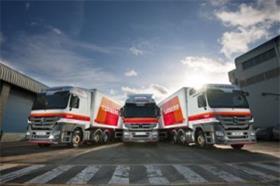
“You would need to understand that business in its entirety, to understand what City Link has actually done wrong, why they have gone into receivership, and decide if you can fix it. You get an instinctive feel as to whether this has a chance of success. You only have a certain amount of time and you cannot go after every possible opportunity – you will make errors.”
Day is not looking to expand Turners’ small presence outside the UK either. “We have had one or two operations abroad and at the moment, unless there was a major opportunity with a specific customer who we had long-standing arrangements with in the UK, it is not on our agenda to go and develop in other countries,” he says. “There are enough opportunities within the UK for us to develop our business.”
But he says a move into road/rail multimodal operations is not out of the question. “I do not think it is completely wrong to operate trains – it is quite a good idea,” he says. “I can see us going down that path if the container operation warranted having our own train. Then it would be a natural extension to what we do. At this moment we are nowhere near big enough to do that. It would not make economic sense to have our own trains. It would be better to have a shared user provider to provide the train service.”
Looking to the future, Days sees tough economic conditions for business for at least the next five and probably 10 years. “For Turners, we have to maintain focus on the really important things: customers, costs, our people and clever, efficient solutions,” he says. “Customers want flexible and cost-effective solutions whether that be in transport, warehousing or added- value services; that’s what we have to provide to maintain success long term.
“Our people want stability and security – they give their best for the business and we must provide that. We have to provide an advantage to our customers, there’s no point chasing work where we haven’t got any advantages, we need clever solutions and ideally we want a geographical advantage too.”
Growing the business remains important but they have to be “sensible business opportunities, whether that be organically or through acquisition”. “But it’s not my sole target,” says Day. “If we operate sensibly, I’m confident we will grow over the medium term and there’ll be plenty of opportunities for us – hopefully we’ll still be able to spot the good ones, act quickly and decisively and we’ll continue building the company over the next 20 years as we have over the past 20.”













